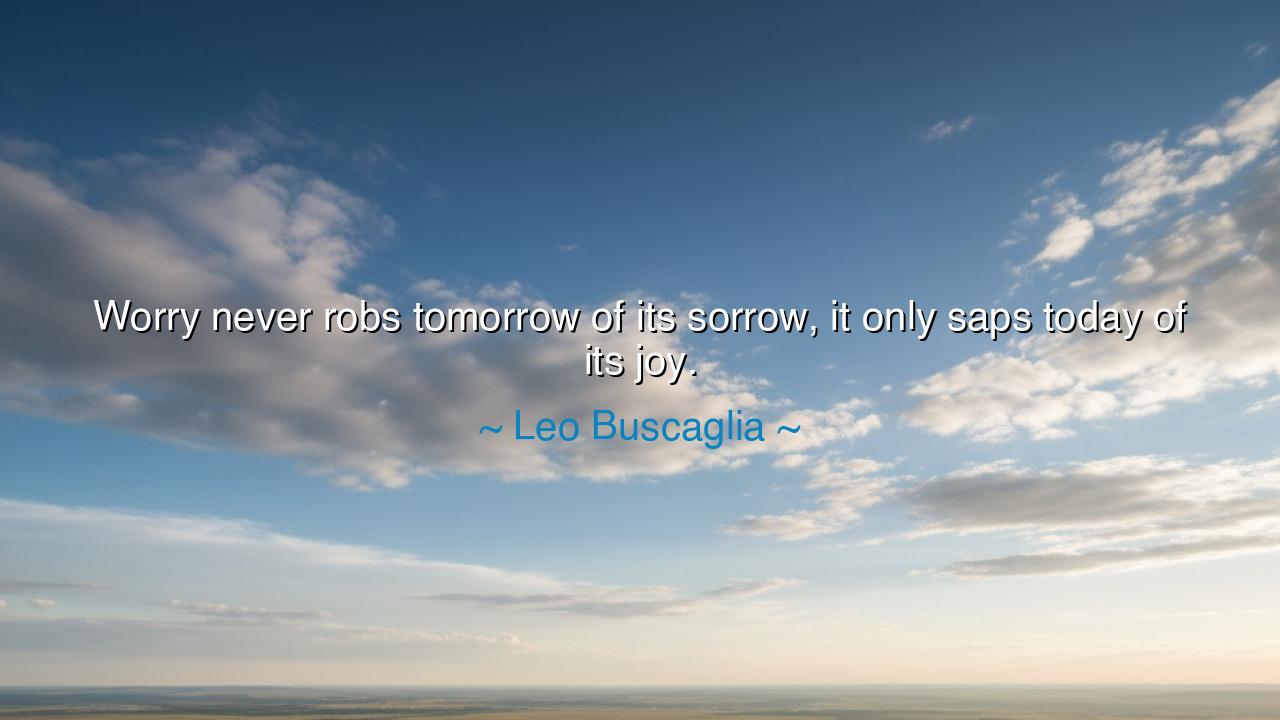
Worry never robs tomorrow of its sorrow, it only saps today of






The great teacher of love and humanity, Leo Buscaglia, once declared with the simplicity of a sage: “Worry never robs tomorrow of its sorrow, it only saps today of its joy.” In these few words, he captured the quiet tragedy of the human heart—that in our fear of what may come, we forfeit the peace that already is. This is the timeless wisdom that those who walk close to truth have always known: that worry is not protection but poison, not preparation but paralysis. To live in constant anticipation of sorrow is to live half a life, for one’s mind drifts into the shadows of what is not yet real, while one’s heart forgets to rejoice in the light of what is.
The origin of this quote lies in Buscaglia’s lifelong mission to awaken people to the power of love and presence. A professor, philosopher, and humanitarian, he devoted his life to teaching that love is an action, not a feeling—a choice to embrace life with courage and openness. In this spirit, his words on worry arise not from abstraction but from compassion. He saw how people, burdened by anxiety about the future, drained their own vitality, unable to taste the sweetness of the present moment. His insight was not new, but eternal. It echoes the wisdom of the ancients who said: “Do not borrow trouble from tomorrow, for tomorrow will bring its own.”
To worry is to live in two worlds—the world of now, and the world of not-yet. But no one can live fully in both. The mind that dwells too long in the future forgets the miracle of today. The sunrise that breaks the night, the laughter of a friend, the peace of breath—these are lost to those who allow their thoughts to circle endlessly around what might be. The wise know that the future is a river whose course cannot be seen, and that no amount of anxiety can change its flow. Worry steals joy, and yet gives nothing in return. It offers no power over fate, no shield against loss—only exhaustion.
Consider the life of Marcus Aurelius, the philosopher-emperor of Rome, who ruled during plague, war, and turmoil. In his Meditations, written as a private journal to himself, he warned against the futility of anxiety. “Do not be anxious,” he wrote, “for what lies ahead is governed by reason and cannot escape the order of nature.” Though surrounded by uncertainty, he trained his mind to remain steady, present, and grateful. Marcus knew, as Buscaglia later would, that to live well is to meet each day as it comes—fully, soberly, and without fear. Those who spend their hours fearing the future lose not only peace, but strength; for worry weakens the very spirit needed to face what comes.
Worry, at its root, is born from love—the love of safety, of those we cherish, of life itself. But when left unchecked, it becomes a shadow of that love. It turns protection into control, and affection into fear. To worry endlessly about those we love does not keep them safe—it only dims our ability to love them freely in the moment we have. A mother who spends her days fearing for her child’s future misses the sacred beauty of her child’s laughter in the present. Thus, the wise do not suppress love; they purify it of fear. They transform worry into faith—faith not in outcomes, but in the strength of the human spirit to endure.
The lesson of Buscaglia’s words is clear: the only day that belongs to you is today. Tomorrow will bring its joys and sorrows whether you fear them or not. The wise prepare for the future but do not dwell in it. They act with care, plan with reason, but leave room for life’s mystery. The practice of peace is not found in control, but in trust—in trusting that whatever awaits, you have within you the courage to meet it.
So, my child, when you feel the weight of worry pressing upon you, pause and breathe. Return to the present. Look around you: the sunlight upon your hands, the voice of a friend, the rhythm of your own heartbeat—these are the truths of now. Do not trade them for imagined troubles. Tend to what you can, release what you cannot. In this way, you will live each day with grace, and meet tomorrow not with fear, but with strength.
Thus, as Leo Buscaglia taught, “Worry never robs tomorrow of its sorrow; it only saps today of its joy.” Remember this, and live by it. Let your heart be anchored in the present moment, for joy is not found in what may be, but in what already is. The one who learns to dwell in today walks in peace, and that peace—unlike worry—can neither be stolen by sorrow nor diminished by time.






AAdministratorAdministrator
Welcome, honored guests. Please leave a comment, we will respond soon